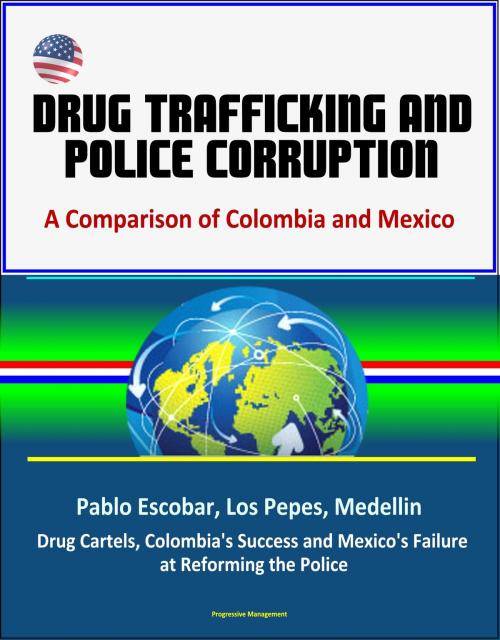Drug Trafficking and Police Corruption: A Comparison of Colombia and Mexico - Pablo Escobar, Los Pepes, Medellin, Drug Cartels, Colombia's Success and Mexico's Failure at Reforming the Police
Nonfiction, History, Americas, Latin America, Social & Cultural Studies, True Crime| Author: | Progressive Management | ISBN: | 9781311388094 |
| Publisher: | Progressive Management | Publication: | May 19, 2016 |
| Imprint: | Smashwords Edition | Language: | English |
| Author: | Progressive Management |
| ISBN: | 9781311388094 |
| Publisher: | Progressive Management |
| Publication: | May 19, 2016 |
| Imprint: | Smashwords Edition |
| Language: | English |
This excellent report has been professionally converted for accurate flowing-text e-book format reproduction. Police officers working in countries plagued by drug trafficking are often offered a choice between "plata o plomo" ("silver or lead"). Given this option, it is not surprising that levels of police corruption are high in these nation-states. Significantly, however, levels of police corruption do differ radically between those countries where the levels of drug production and trafficking are similar. This thesis examines the case of Mexico, where corruption has been historically high and has increased in recent times; and the case of Colombia, where levels of police corruption have been relatively low and might even be said to be on the decline. Specialists in police reform and anti-corruption typically look at administrative factors such as ethics, salary levels, the purging of corrupt officials, and the recruiting and training of "clean" officers as essential elements in the prevention of police corruption. While these factors explain some of the differences in levels of corruption, this thesis fills an important gap in the existing literature by moving beyond these conventional explanations. In particular, it introduces a country-specific approach to drug-related police corruption, including factors such as the organizational structure of the police force (centralized or decentralized), the legacy of the "political criminal nexus" in the country concerned, and both the size and "ideology" of the drug trafficking organizations involved.
CHAPTER I - INTRODUCTION * A. IMPORTANCE * B. LITERATURE REVIEW AND METHODOLOGY * C. SOURCES AND THESIS ORGANIZATION * CHAPTER II - DRUG-RELATED POLICE CORRUPTION IN MEXICO * A. INTRODUCTION * B. MEXICAN POLICE CORRUPTION DURING PRI HEGEMONY * C. MEXICAN POLICE CORRUPTION FROM 2000-TO-PRESENT * D PUBLIC TRUST IN THE MEXICAN POLICE * E. MEXICAN POLICE REFORM EFFORTS * F. CONCLUSION * CHAPTER III - DRUG-RELATED POLICE CORRUPTION IN COLOMBIA * A. INTRODUCTION * B. THE COLOMBIAN NATIONAL POLICE - AS A SOURCE AND TARGET OF VIOLENCE. * C. UNHOLY ALLIANCE: THE COLOMBIAN NATIONAL POLICE AND LOS PEPES * D. COLOMBIAN NATIONAL POLICE OFFICERS ON THE CARTEL PAYROLL (1980-1994) * E. REFORMING THE CNP: THE 1991, 1993 AND 1995 POLICE REFORM EFFORTS . * F. CURRENT LEVELS OF POLICE CORRUPTION, 1995 TO 2008 * G. WINNING PUBLIC TRUST: THE CHANGING PERCEPTION OF THE CNP * H. CONCLUSION * CHAPTER IV - EXPLAINING POLICE CORRUPTION * A. INTRODUCTION * B. POLICE SUBCULTURE AND THE POLITICAL CRIMINAL NEXUS (PCN) * C ADMINISTRATIVE FACTORS IN MEXICO AND COLOMBIA * 1. The Police Recruitment Process in Mexico * 2. The Police Recruitment Process in Colombia * 3 Police Salaries, Resources, Promotion and Training in Mexico * 4 Police Salaries, Resources, Promotion and Training in Colombia * 5. U.S. Military and Police Aid to Mexico and Colombia * D. COLOMBIA'S SUCCESS AND MEXICO'S FAILURE AT REFORMING THE POLICE * E. CENTRALIZED VERSUS DECENTRALIZED POLICE SYSTEMS * F. CARTEL SIZE AND IDEOLOGY * CHAPTER V - CONCLUSION AND RECOMMENDATIONS * A. INTRODUCTION * B. COMPARING CORRUPTION IN MEXICO AND COLOMBIA * C. RECOMMENDATIONS FOR BOTH POLICING SYSTEMS
Keywords: Political Criminal Nexus (PCN), Mexico, Colombia, Police, Drug-related police corruption, plaza system, Partido Revolucionario Institutional, Federal Preventative Police (PFP), Agencia Federal de Investigaciones (AFI), Colombian National Police (CNP), Pablo Escobar, Medellin Drug Cartel, Cali Drug Cartel, Mexican Drug Cartels, The Mexican Federation, Federal Judicial Police, de-centralized policing system, centralized policing system.
This excellent report has been professionally converted for accurate flowing-text e-book format reproduction. Police officers working in countries plagued by drug trafficking are often offered a choice between "plata o plomo" ("silver or lead"). Given this option, it is not surprising that levels of police corruption are high in these nation-states. Significantly, however, levels of police corruption do differ radically between those countries where the levels of drug production and trafficking are similar. This thesis examines the case of Mexico, where corruption has been historically high and has increased in recent times; and the case of Colombia, where levels of police corruption have been relatively low and might even be said to be on the decline. Specialists in police reform and anti-corruption typically look at administrative factors such as ethics, salary levels, the purging of corrupt officials, and the recruiting and training of "clean" officers as essential elements in the prevention of police corruption. While these factors explain some of the differences in levels of corruption, this thesis fills an important gap in the existing literature by moving beyond these conventional explanations. In particular, it introduces a country-specific approach to drug-related police corruption, including factors such as the organizational structure of the police force (centralized or decentralized), the legacy of the "political criminal nexus" in the country concerned, and both the size and "ideology" of the drug trafficking organizations involved.
CHAPTER I - INTRODUCTION * A. IMPORTANCE * B. LITERATURE REVIEW AND METHODOLOGY * C. SOURCES AND THESIS ORGANIZATION * CHAPTER II - DRUG-RELATED POLICE CORRUPTION IN MEXICO * A. INTRODUCTION * B. MEXICAN POLICE CORRUPTION DURING PRI HEGEMONY * C. MEXICAN POLICE CORRUPTION FROM 2000-TO-PRESENT * D PUBLIC TRUST IN THE MEXICAN POLICE * E. MEXICAN POLICE REFORM EFFORTS * F. CONCLUSION * CHAPTER III - DRUG-RELATED POLICE CORRUPTION IN COLOMBIA * A. INTRODUCTION * B. THE COLOMBIAN NATIONAL POLICE - AS A SOURCE AND TARGET OF VIOLENCE. * C. UNHOLY ALLIANCE: THE COLOMBIAN NATIONAL POLICE AND LOS PEPES * D. COLOMBIAN NATIONAL POLICE OFFICERS ON THE CARTEL PAYROLL (1980-1994) * E. REFORMING THE CNP: THE 1991, 1993 AND 1995 POLICE REFORM EFFORTS . * F. CURRENT LEVELS OF POLICE CORRUPTION, 1995 TO 2008 * G. WINNING PUBLIC TRUST: THE CHANGING PERCEPTION OF THE CNP * H. CONCLUSION * CHAPTER IV - EXPLAINING POLICE CORRUPTION * A. INTRODUCTION * B. POLICE SUBCULTURE AND THE POLITICAL CRIMINAL NEXUS (PCN) * C ADMINISTRATIVE FACTORS IN MEXICO AND COLOMBIA * 1. The Police Recruitment Process in Mexico * 2. The Police Recruitment Process in Colombia * 3 Police Salaries, Resources, Promotion and Training in Mexico * 4 Police Salaries, Resources, Promotion and Training in Colombia * 5. U.S. Military and Police Aid to Mexico and Colombia * D. COLOMBIA'S SUCCESS AND MEXICO'S FAILURE AT REFORMING THE POLICE * E. CENTRALIZED VERSUS DECENTRALIZED POLICE SYSTEMS * F. CARTEL SIZE AND IDEOLOGY * CHAPTER V - CONCLUSION AND RECOMMENDATIONS * A. INTRODUCTION * B. COMPARING CORRUPTION IN MEXICO AND COLOMBIA * C. RECOMMENDATIONS FOR BOTH POLICING SYSTEMS
Keywords: Political Criminal Nexus (PCN), Mexico, Colombia, Police, Drug-related police corruption, plaza system, Partido Revolucionario Institutional, Federal Preventative Police (PFP), Agencia Federal de Investigaciones (AFI), Colombian National Police (CNP), Pablo Escobar, Medellin Drug Cartel, Cali Drug Cartel, Mexican Drug Cartels, The Mexican Federation, Federal Judicial Police, de-centralized policing system, centralized policing system.















